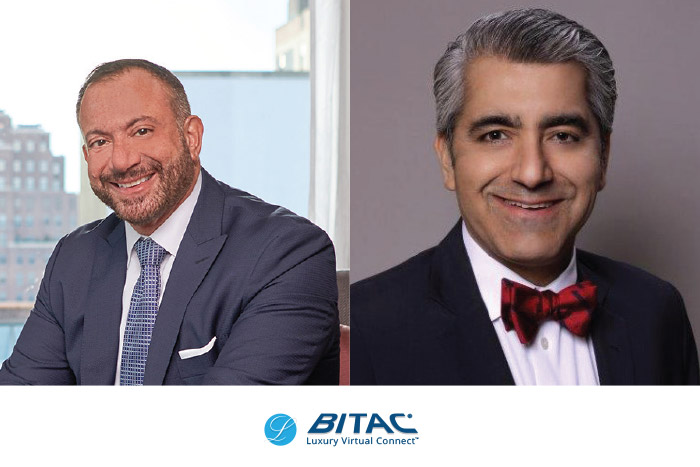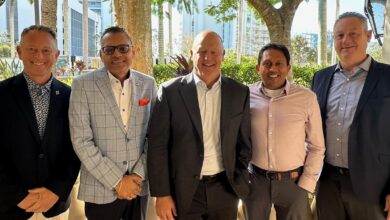
Stepping Up
By Dennis Nessler | March 10, 2021
Increasing engagement with its customers, creating unique experiences and the need to continually innovate are among the keys to success for the luxury segment in the wake of the pandemic and the resulting downturn, according to a pair of luxury brand executives.
Speaking at BITAC Luxury Virtual Connect 2021, Gregory Habeeb, president, North America, WorldHotels, and Ashish Verma, SVP, Luxury division, Dream Hotel Group, shared their views on the segment during a panel entitled “Stepping Up: Keys To Success In Today’s Luxury Landscape.”
Verma focused on what he sees as primarily positive changes to the segment since the start of the pandemic last March.
“I think luxury has been under more scrutiny because it’s often looked as being perhaps a bit isolated and bit aloof and not as engaging. I think what it [the pandemic] has gotten luxury to do is to commit more to engage with the community and to engage more with all levels of hospitality and partners trying to find more values which fulfill us and which give us deeper ethos,” he said.
Verma later described what he hopes will be the end result of the aforementioned shift in approach. “It will become a new reality for the industry at large to recognize that luxury is not isolated or aloof, but it is very much an integral part of every segment of the industry of which we’re so proud. We learn from each other all the time.”
“I always say with crisis comes innovation and whether you’re playing in the luxury landscape or upper-upscale or mid-market, you have to innovate. Luxury has that sense of community, philanthropy and anticipatory high-touch points. This pandemic has forced us to look at different ways to deliver that not just physically, but in every other way. Emotionally people that are checking into luxury hotels feel like they’re doing good for their community and many of our hotels have that sense of community,” said Habeeb.
He further added, “I think this is forcing luxury to evolve and as long as our eyes, ears and our hearts are open we’re going to be innovating and we have been innovating.”
But like every segment of the lodging industry, luxury has been challenged to maintain rates in the face of declining demand and occupancy levels.
Habeeb, however, pointed out that’s not necessarily the case across the board.
“Some of our resorts have actually had an excellent year because you can spatially distance. As a matter of fact, some of them came at a premium. If you’re a city-center box hotel you have a bit more of a challenge when it comes to the pricing,” he said.
Habeeb further added there is still plenty of opportunity.
“There is pent-up demand and people want to do something so it’s up to us to recalibrate it and deliver something if we can. Average daily rates have been hurt in city centers, I think everyone realizes that but some hotels are doing better than others. The ones that have the physical property that can innovate and communicate that to clients, as well getting the word out that they’ve changed, are positioned well for success.”
Verma boiled it down to supply and demand as he emphasized the importance of holding rate.
“The demand in the urban environment is not as much so the rates have been flexed a little bit. At the same time in New York City the operating costs are high so you cannot flex too much. Moreover, I believe that in these circumstances you’re not going to stimulate demand by lowering the prices or rates. So you maintain the rates and you suffer the consequences of lower occupancy, but not because of the rates,” he said.
Both executives, meanwhile, acknowledged the importance of the storytelling aspect when it comes to creating a true luxury experience and detailed some of the ways they go about that.
“Luxury has evolved and increasingly it’s become more experiential where you want to leave with memories. It’s not about souvenirs and taking lots of memories back in terms of tangibles. The intangible element of luxury is what has become tangible,” said Varma.
He referenced The Chatwal, a Luxury Collection Hotel, New York City, as a prime example of that experience. Varma noted the midtown Manhattan property has been heralded as the city’s #1 Hotel by the 2018 Condé Nast Traveler Readers Choice Awards and has also been honored by U.S. News and World Reports.
“These are all ultimately recognition of how we create those experiences and specifically for the destination. We are proud to be in the heart of Manhattan, which is very convenient to the major attractions from Broadway to the museums and the landmark elements of entertainment from Radio City Music Hall to Madison Square Garden. So for a quintessential New York experience you need ‘packages.’ But I underscore that it’s not just selling an idea or a collection of some of the activities it must translate into what the guest feels from the time they make a reservation through the arrival,” said Varma.
Habeeb reinforced the point.
“Core to WorldHotels is the storytelling, we’re curators of 300 different stories. It’s really creating those unique experiences that should reflect the destination that we serve and we serve over 200 destinations around the globe. Every hotel is inspected before they [join] but, for example, we look at their story. A lot of the independent hotels because they’re not cookie cutter and it’s not a chain hotel there’s usually a mind or a family behind it that really want to elevate that guest experience. It’s about design, it’s about the amenities and it’s about the experiences,” he said.
Habeeb offered some examples to amplify the point.
“Are you in South Africa and you want to have that experience of a safari? In New York yes it’s about Broadway. In Los Angeles, they may want to have a Hollywood experience and tour some of the studios,” he noted.
Habeeb referenced a recent company call while noting there was plenty of reason for optimism when it comes to growing the brand, which has some 30 offices globally.
“Hotels come to us because we’re all independent and they need resources to help compete and what we relied on in 2019 may not be what we rely on now. For the first time [since the pandemic] every single one of our developers around the world have really had positive feedback and it’s refreshing,” he said.





Get involved!
Comments